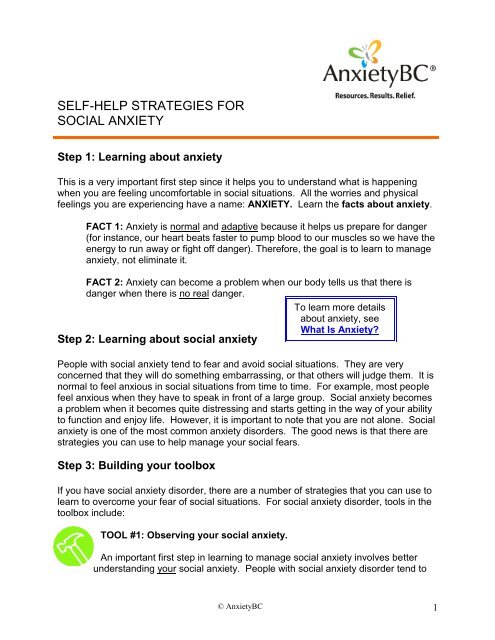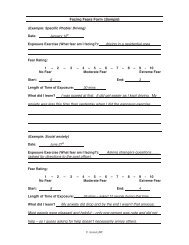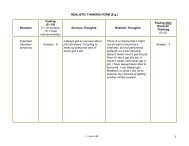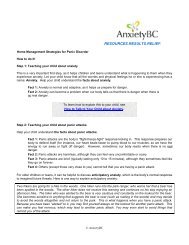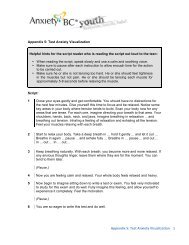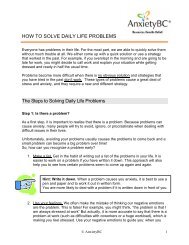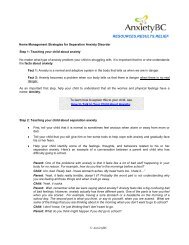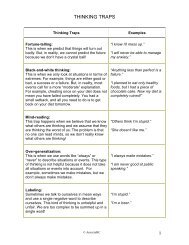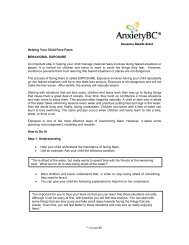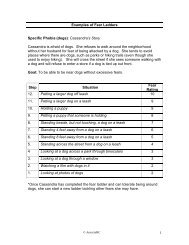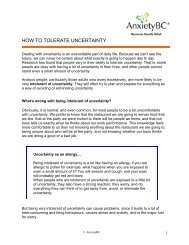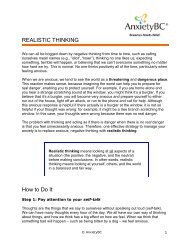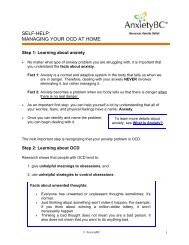Self-Help Strategies for Social Anxiety - AnxietyBC
Self-Help Strategies for Social Anxiety - AnxietyBC
Self-Help Strategies for Social Anxiety - AnxietyBC
Create successful ePaper yourself
Turn your PDF publications into a flip-book with our unique Google optimized e-Paper software.
Is not saying something stupid so important my whole future depends on it? Well,it would be embarrassing, but no, my whole future does not depend on it.What is the worst that could happen? I do say something stupid and people laugh.What could I do to cope? I guess I could try and crack a joke about it. Or, I couldexcuse myself and go get some fresh air.Is there another way of looking at this situation? Everyone says stupid things oncein a while.What would I say to a friend who had this thought? It’s not the end of the world. Weall say silly things and most of the time people don’t remember exactly what you said.For more in<strong>for</strong>mation on identifying and evaluating scary thoughts, see RealisticThinking.TIP: People with social anxiety disorder often hold some unrealisticbeliefs. Common examples include:I need to be perfect to be likedI should never make mistakesIt is important <strong>for</strong> everyone to like meIt’s not okay to be anxiousHowever, no one is perfect and everyone makes mistakes. Also, it’s unrealisticto think everyone will like us - Do you like everyone? <strong>Anxiety</strong> is often a privateexperience that others don’t notice. Even if they do, it doesn’t mean that theywill think less of you – Haven’t you ever seen someone else anxious? It’snormal. It’s okay to be imperfect and to feel anxious. It’s part of being human!Rather than fighting these things, try working on accepting them.By evaluating your negative thinking, you may realize that some of the things you fearare very unlikely to actually happen, or that if something does happen it’s not as bad asyou may think and that you can cope. Practise evaluating your anxious thoughts by firstwriting them down and then trying to identify more realistic ways of thinking (by using thequestions presented in this section, as well as those presented in the RealisticThinking module).© <strong>Anxiety</strong>BC 5
Test it out!Sometimes it can be helpful to examine the truthfulness of your thoughts or beliefs. Forexample, how bad would it be if others saw you blush/shake, or how terrible would it beif you said something foolish? We often assume that it would be horrible if these thingshappened, and that we would be unable to cope. However, we need to test this out!Purposely try to shake, and see how others react. Plan to say something foolish or askan obvious question and see what happens! Be careful not to assume that others arereacting negatively – look at the facts! What did they do or say? Was it as bad as youthought?Examples of experiments include: Ask a “silly” question (e.g., ask <strong>for</strong> directions to a street you are already on) Let your hand shake while holding a glass of water Spill a drink Drop something or knock something over Wear your shirt inside out Send an e-mail with spelling mistakes Mispronounce a word Pretend to lose your train of thought and stop mid-sentence Pretend to trip Wait <strong>for</strong> the cashier to close the till and then ask <strong>for</strong> changeTOOL #4: Facing fearsIt’s normal to want to avoid situations that cause you anxiety. Avoidingfeared social situations is a very effective strategy because it reduces anxiety in theshort-term. However, avoiding social situations increases your fear in the long-termbecause it prevents you from learning that your feared expectations are either unlikely toactually happen or aren’t as bad as you think. There<strong>for</strong>e, an important step in managingyour social anxiety is to face the situations that you have been avoiding because ofsocial fears. Repeatedly facing those situations reduces distress in the long-term andhelps build up confidence.First, make a list of the social situations that you fear (e.g., saying “hi” to a co-worker,asking a stranger <strong>for</strong> directions, making a phone call, etc.). Refer back to the list youmade when you spent some time observing your social anxiety and identifying thesituations that cause you anxiety (see Tool #1). Common types of feared socialsituations include public speaking, in<strong>for</strong>mal socializing, being assertive, dealing withconflict, being the center of attention, eating and drinking in front of others, speaking to© <strong>Anxiety</strong>BC 6
These strategies prevent you from realizing that the situation is not dangerous, and thatthese behaviours may not be necessary to keep you safe. Thus, part of exposureinvolves reducing some of these subtle avoidance strategies or safety behaviours. Tryto identify the things you do in social situations to feel safer (and make a list). Then tryto reduce engaging in some of these behaviours when facing feared situations.TIP: People with social anxiety tend to focus on themselves during socialsituations, which tends to make them feel even more anxious. Whensocializing with others, try to pay attention to what other people are doingor saying.Meeting New PeopleOnce you have gained some confidence facing social situations, it may be time to startthinking about expanding your social network. People with social anxiety disorder oftenhave a hard time developing new relationships. Having opportunities to meet otherpeople and develop friendships is very important. <strong>Social</strong> situations that provideopportunities <strong>for</strong> repeated contact are the best ways to develop friendships. Try andbrainstorm ways to get involved with other people. Here are some ideas of where youcan meet people:Work or school (talk to co-workers, go <strong>for</strong> lunch together, share coffee breaks)Play a sport/exercise (join a gym or running group, play soccer or tennis)Join a club/organization (travel club, hiking group, singles group, etc.)Take a class (painting, pottery, language course (e.g., Spanish, French) etc.)Volunteer (community centres, hospitals, charitable organizations)Take group lessons (swimming, dance)Go to sports facilities (skate park, ski hill)Dating services/On-line datingTIP: Make a concrete plan to meet new people. Pick from some of theideas listed above and take the steps to get involved. For example, do asearch on the Internet <strong>for</strong> hiking groups in your area. If you make anattempt to make new friends and it doesn’t work out, keep trying. It takestime to develop friendships and relationships. It can be very scary at first, but if youdon’t try, you reduce your chances of making friends or meeting someone special. SeeGuide to Goal Setting <strong>for</strong> some ideas on how to set goals around meeting new people.© <strong>Anxiety</strong>BC 8
What if I need other skills?Many people with social anxiety disorder believe that they lack social skills. In manycases, these people have the skills, but lack the confidence to use them. However,some people do have deficits in their social skills, and may benefit from learningstrategies <strong>for</strong> communicating more effectively. For more in<strong>for</strong>mation, see EffectiveCommunication – Improving Your <strong>Social</strong> Skills.Step 4: Building on braveryLearning to manage anxiety takes a lot of hard work. If you are noticing improvements,take some time to give yourself some credit: reward yourself!How do you maintain all the progress you’ve made?Practise! Practise! Practise!In a way, learning to manage anxiety is a lot like exercise – you need to "keep in shape"and practise your skills regularly. Make them a habit! This is true even after you arefeeling better and have reached your goals.Don't be discouraged if you start using old behaviours. This can happen during stressfultimes or during transitions (<strong>for</strong> example, starting a new job or moving). This is normal. Itjust means that you need to start practising using the tools. Remember, coping withanxiety is a lifelong process.For more in<strong>for</strong>mation on how to maintain your progress and how to cope with relapses insymptoms, see How to Prevent a Relapse.© <strong>Anxiety</strong>BC 9


